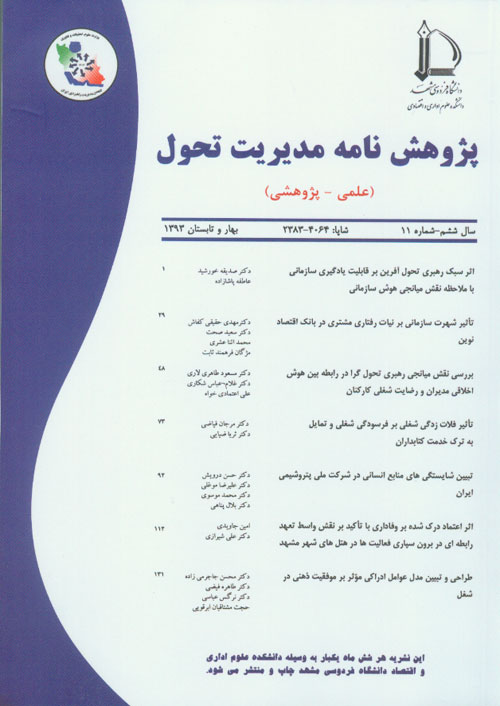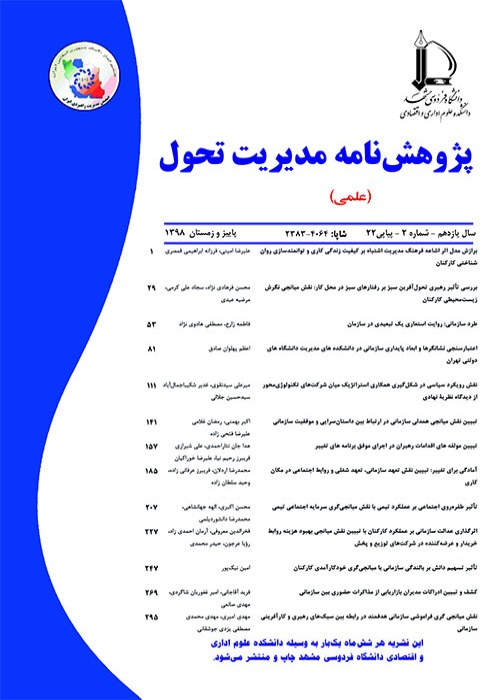فهرست مطالب

پژوهش نامه مدیریت تحول
سال ششم شماره 1 (پیاپی 11، بهار و تابستان 1393)
- تاریخ انتشار: 1393/06/15
- تعداد عناوین: 7
-
-
Page 1In a rapidly changing environment, turbulent, unpredictable and full of uncertainty, organizations should have a productive, creative and continuous learning capability and potential in order to survive, grow, and accomplish goals in order to create superior value for all their stakeholders, especially customers. Such a learning capability of organization and its continuous development depends on numerous factors, including organizational intelligence (having a strategic vision, to be appetite for change, to care to human resources and manage on employees’ hearts, and knowledge deployment. ..) and organization management's leadership style. This research intends to investigate the impact of transformational leadership style on organizational learning capability as well as the mediating role of organizational intelligence. The research method is descriptivecorrelation. The statistical population consists of Telecommunications Infrastructure Company's employees, from which a sample of 472 was selected. The data was collected by using a questionnaire, and was analyzed by the descriptive and inferential statistical tests. The research findings showed that; transformational leadership style has significant, positive and direct effect on organizational intelligence, and learning capability while organizational intelligence has a significant, positive and direct impact on organizational learning capability. The results also showed that organizational intelligence is partially mediating the relationship between the transformational leadership style and organizational learning capability. The results of path analysis showed that the transformational leadership style has a significant and indirect impact on organizational capability through organizational intelligence.Keywords: Transformational leadership, Organizational learning capability, Organizational intelligence
-
The impact the corporate reputation on customer behavioral intentions (Case of: Eghtesad Novin Bank)Page 29In this study, we addressed the relationship between corporate reputation and customerbehavioral intentions in the Eghtesad Novin bank. For this purpose, we considered thecomponents: trust, identification and commitment as mediator variables that led toformulating 8 hypothesis. The research population was the customers of Eghtesad NovinBank in Tehran branches who had at least one active account in this bank. We used aquestionnaire of 25 questions for data collection. After validity and reliability analysis,these questionnaires were distributed among customers. Collected data was analyzed usingfactor analysis and structural equations analysis. The results of our study were as thefollowing: the model has a good fit; the corporate reputation has a meaningful relationshipwith the customer behavioral intentions; and corporate reputation showed to havemeaningful relationship with customer behavioral intentions through the followingcomponents: identification, trust, and commitment. Based on these results we made severalsuggestions.Keywords: Corporate reputation, Customer behavioral intentions, Commitment
-
Page 48Leaders need Ethic, because they are responsible. People in leadership positions are the source of employee’s behavioral changes that requires leaders with high moral intelligence. On the eve of the third millennium, with acute competitive conditions, changes in management practices and organizational leadership are inevitable. In such circumstances, taking advantage of transformational leadership for the development of human capacities, enhancing employee commitment, and job satisfaction, in many leading organizations have proved to be successful. This study examines the mediating role of transformational leadership in the relationship between moral intelligence managers and job satisfaction of staff. Statistical population of this study includes all managers and employees of a public organization. Research data was collected using questionnaires through a randomized sampling method. In order to analyze the research questions, exploratory and confirmatory factor analysis was utilized to identify latent variables. Structural Equation Modeling was used to test the research hypothesis. Our findings confirmed the mediating role of transformational leadership in the relationship between moral intelligence managers and job satisfaction of staff.Keywords: Moral Intelligence, Transformational Leadership, Job Satisfaction
-
Page 73The purpose of this study was to evaluate career plateau of academic librarians and their impact on burnout and intention to leave. For this purpose, data was analyzed from a sample of 537 collected both manually and electronically from research population. The results show a rate of above average job Plateau including structural and content Plateau, burnout and intention to leave among librarians. While gender does not make a significant difference in the perception of job plateau, less educated and more experienced employees perceive more plateauing. In addition, regression analysis indicates that career plateau has significant impact on burnout and intention to leave of librarians. In other words, librarians with higher perceived career plateau, tend to experience more job burnout and intention to leave.Keywords: Career plateau, Structural plateau, Content Plateau intention to leave, Job burnout
-
Page 92The aim of this study is to investigate human resource competencies in Iranian Petroleum Company. This study is a descriptive-analytical approach. In this research, we examined human resource competencies in six main categories including; credible activist, culture & change steward, talent manager/organizational designer, strategy architect, operational executor, business ally, as well as 21 sub indicators. To collect data, we used a designed questionnaire with 60 items. The collected data were analyzed by T-Test and Confirmatory Factor Analysis tests. The results showed, all of human resource competencies recorded above average score. Also the results showed that strategy architect and business ally had the highest average and the culture & change steward had the lowest average. The research also revealed that strategy architect and credible activist have the lowest and highest correlation with Human resource competencies respectively. According to the results, it is suggested that managers need to identify skills relevant to these competencies, and take necessary steps to learn and practice them.Keywords: Credible Activist, Culture, Change Steward, Talent Manager, Organizational Designer, Strategy Architect, Operational Executor, Business Ally, Human Resource Competencies
-
Page 112In today’s business environment, firms in pursuing the goal of efficiency, outsource many necessary, but non-core operations. The majority of pervious outsourcing studies have focused on the costs and benefits analysis, while this research work examines a behavioral approach in outsourcing decisions. This study examines the effects of perceived trust on loyalty through mediatory role of relationship commitment in outsourcing activities in Mashhad hospitality industry. To collect data, a questionnaire was distributed among procurement officials and hotel managers in Mashhad hotels, using stratified random sampling. To test the hypothesis, structural equation analysis was performed. The results revealed that the perception of trust affects loyalty and the intermediary role of relationship commitment on loyalty was confirmed.Keywords: Perceived Trust, Relationship commitment, Loyalty, Outsourcing, Hospitality industry
-
Page 131Existing workplace throughout the world have experienced wide changes in the nature of jobs. Given the severity of these changes, it is referred to the new employment model. In this position, intrinsic career has become more important than extrinsic career. Given the importance of the perception in intrinsic career success, the purpose of this research was to design and explain model of perceptual factors affecting intrinsic career success in service firms of Fars Province. For this purpose, with the aim of relevant literature, the most perceptual factors were considered. Then through the Delphi process using expert opinion in four steps, the most important factors in research population were identified. Finally seven factors, as most perceptual factors were determined and used in designing the path model. These factors based on the total impact on subjective career success respectively were: perceived organizational support, person-organization fit, perceived career path, learning climate, career self-efficacy, intrinsic motivation at work and organizational selfesteem. Then on the basis of previous researches, analytical model was designed, and collected data from research population was analyzed using LISREL software. The designed model explained 72% of the variation in subjective career success, which indicates the important role of perception in subjective career success. Also the model fitness indexes were in acceptable range. Conclusions and recommendations of study can help the career success of employees in service organizations and other similar companies in Iran.Keywords: Intrinsic career success, Perception, Perceived organizational support, Personorganization fit, Organizational learning climate, Perceived career path, Career selfefficacy, Intrinsic motivation at work, Organization based self, esteem


